River Rwizi will be history soon - locals
The river is a few metres away from the gardens, but because of the encroachment on the river’s banks, it is hard to realise that there is water flowing.
ENVIRONMENT
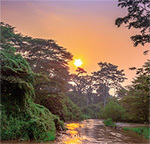
At least 12 districts depend on River Rwizi's water for both domestic and commercial use. However, the 8,200km river is on the verge of drying up due to degradation. Starting today, New Vision and its sister platforms New Vision TV, Orumuri, TV West and Radio West, will explore different options that can be taken to save the river. Andrew Masinde visited the river area and explains its current state and views of key stakeholders
________________________________
People are weeding their gardens. Some are weeding cabbages, while others are harvesting eggplants. In the gardens, gullies have been created for water to fl ow into the gardens.
For a visitor, one is left wondering where the water used for farming comes from. It is until you interact with some of the farmers that you realise the water is from River Rwizi.
The river is a few metres away from the gardens, but because of the encroachment on the river's banks, it is hard to realise that there is water flowing. What used to be papyrus-filled river banks now there is a clearing and instead, there are water channels from the river connecting to the gardens.
Farmers say they had no alternative to farming other than River Rwizi's banks and wetlands. However, they said it was true the water levels had declined over the years and they fear the river will be no more if nothing is done.
One of the farmers said: "The river was wide but now, it is narrowing. Sometimes, during the dry season, the water reduces into a stream and, if one is not keen enough, they would think it is not a river. Also, there is hardly any water flowing from the hills."
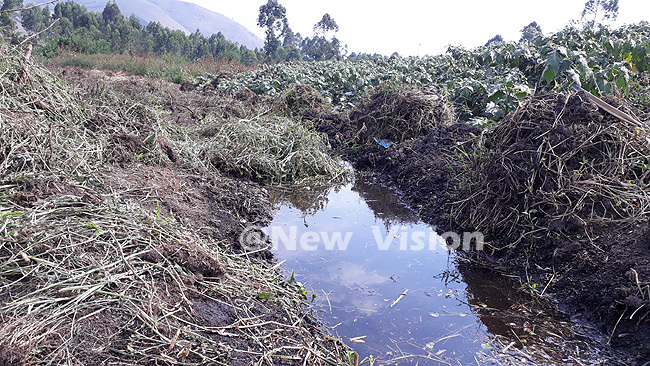
Heaps of sand are common near the gardens. However, as one approaches the mining area, everyone flees. One of the farmers says the sand miners are always arrested. She said sand mining in the river has almost changed its course, and also, in some places the water stagnates.
Farming and sand mining are among the many activities choking River Rwizi to extinction. The assistant commissioner of the directorate of water resources management in the ministry of water and environment, Albert Orijabo, says many wetlands in Uganda have been encroached on.
They are used for agriculture, building and sand mining, among other activities, yet they play a critical role in capturing and storing water. He said forests were being cleared to open land for farming and settlement.
With falling crop yields, many farmers have started encroaching on wetlands and forested areas in the search for fertile soils. For the case of River Rwizi, Orijabo says people have built in the river's catchment, thus interfering with the water flow.
"A lot of untreated waste is being dumped directly into the river. The entities contributing to the pollution are dairies, soft drink manufacturers, hospitals, hotels, a brewery, markets, universities, a research institution, abattoirs and residential buildings too. And if this is not fixed urgently, many diseases are likely to emerge," he said.
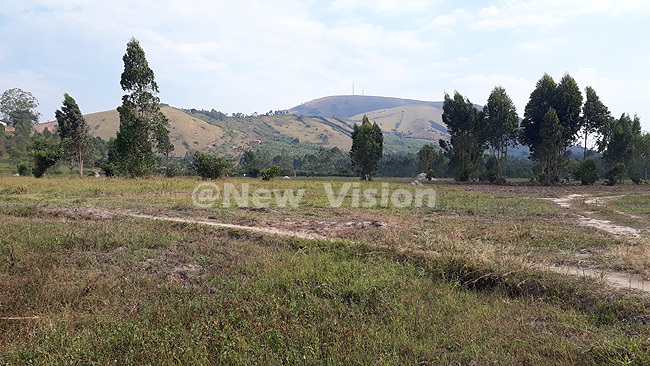
Lt. Col, James Mwesigye, the Resident District Commissioner of Mbarara, said because of encroachment on wetlands and forests within the River Rwizi catchment area, the wetlands and forest cover on the river can no longer hold water.
He noted that whenever there are downpours, the rainwater washes through to the river, carrying topsoil, pollutants and silt with it.
Heavy metals, fertilisers and herbicides have contaminated the waters, thus damaging ecosystems dependent on Rwizi's waters. The silt is affecting the quality of the water from the river.
He added that all this is to some extent because of the laxity in the enforcement of environmental laws.
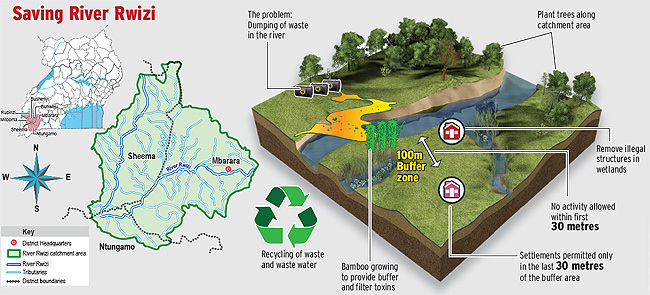
According to Richard Musota, the principal water officer in the ministry of water and environment, the key drivers of Rwizi degradation are rapid urbanisation, which comes with pollution from the construction industry, food industry pollution by an abattoir in the region and poor sanitation, where houses are constructed hardly 10 metres away from the river.
He said toilet facilities are built too close to the river and it has been noticed by the municipality authorities that when it rains, some households release faecal matter, which is dumped into the river. About River Rwizi Rwizi is a Runyakitara word for flowing water.
The river originates from Buhweju hills with various tributaries from Nkore hills, such as Ntungamo and Sheema. It pours its water in Lake Victoria via the drainage systems of Lakes: Mburo, Kachera and Kijanebalola.
The altitude varies from 1,300 to 2,170 metres above sea level.
River Rwizi, which covers approximately 8,200km is the source of water for livelihood to both people and animals in Rakai, Lyantonde, Isingiro, Lwengo, Kiruhura, Mbarara, Bushenyi, Buhweju, Sheema and Rubirizi.
In Mbarara municipality, the river covers 51.5km while the river catchment area stretches over 8,200 sq.km.
The upper, central and lower reaches of the catchment area are covered by wetlands, which make up about 3.5% of the total land area. Its catchment comprises wetlands, forests approximately 2.5%, hills, open water 1%, grassland and shrubs.
The catchment experiences two rainy seasons and two dry seasons. The rainfall here ranges from 690mm to 1,300 mm per year.
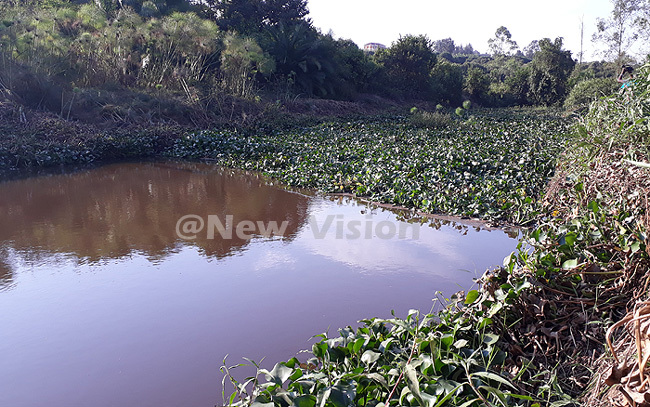
LIKELY IMPACTS OF REDUCED WATER LEVELS
According to Lt. Col, James Mwesigye, the Resident District Commissioner of Mbarara, if nothing is done soon, River Rwizi will not sustain livestock in western Uganda during prolonged dry spells.
Floods have increased with the degradation of river banks and wetlands. The floods have led to the loss of lives. He said Mbarara will no longer have a reliable supply of clean piped water because the river has started drying.
Factories in Mbarara, such as Nile Breweries can only access 10% of their water needs from River Rwizi as opposed to the required 75%. Mwesigye is worried that the next generation will be left with nothing.
"Memories of the river with its ample clean water, thick vegetation, wild animals and birds are quickly fading. Worse still, such river degradation is not unique to the Rwizi," he said.
Capt. John Bamuturaki Tumusiime, the Mbarara district chairperson, says with Mbarara transformation into a city, there is need to have stable and clean water supply.
Jeconeaus Musingwire, the National Environment Management Authority regional manager south western Uganda, says River Rwizi is the main source of water for millions of local people and their livestock.
Musingwire says the water has turned from pure clean water to brown. He says in many places, the water levels have decreased.
"The main economic activities in the catchment area is crop agriculture, livestock rearing, fish farming and tourism through Lake Mburo National Park," he says.
He adds that there are other activities on the river banks such as brick making, sand mining, motor vehicle washing, motor vehicle repair garages, use of papyrus for making and growing of eucalyptus trees.
The wetlands in the catchment play an important role in capturing and storing water and releasing it into the river channel. Musingwire calls for collective efforts to save the river from drying up.
ALSO RELATED TO THIS STORY
Water ministry embarks on strategies to save Rwizi
Mbarara faces hard time as River Rwizi dries up